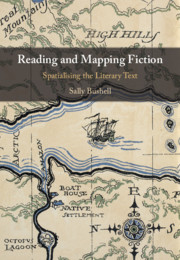Book contents
- Reading and Mapping Fiction
- Reading and Mapping Fiction
- Copyright page
- Dedication
- Contents
- Illustrations
- Acknowledgement of Prior Publications
- Acknowledgements
- Introduction
- 1 A Shifting Relationship: From Literary Geography to Critical Literary Mapping
- 2 Historicising the Fictional Map
- 3 Doubleness and Silence in Adventure and Spy Fiction
- 4 Mapping Murder
- 5 Playspace: Spatialising Children’s Fiction
- 6 Mapping Worlds: Tolkien’s Cartographic Imagination
- 7 Fearing the Map: Representational Priorities and Referential Assumptions
- 8 Reading As Mapping, or, What Cannot Be Visualised
- Bibliography
- Index
7 - Fearing the Map: Representational Priorities and Referential Assumptions
Published online by Cambridge University Press: 11 June 2020
- Reading and Mapping Fiction
- Reading and Mapping Fiction
- Copyright page
- Dedication
- Contents
- Illustrations
- Acknowledgement of Prior Publications
- Acknowledgements
- Introduction
- 1 A Shifting Relationship: From Literary Geography to Critical Literary Mapping
- 2 Historicising the Fictional Map
- 3 Doubleness and Silence in Adventure and Spy Fiction
- 4 Mapping Murder
- 5 Playspace: Spatialising Children’s Fiction
- 6 Mapping Worlds: Tolkien’s Cartographic Imagination
- 7 Fearing the Map: Representational Priorities and Referential Assumptions
- 8 Reading As Mapping, or, What Cannot Be Visualised
- Bibliography
- Index
Summary
Chapter Seven marks a turn away from consideration of ways in which the material presence of the map bears upon authorial and readerly meaning-making, to ways in which the absence, or internalisation, of the map affects the reader’s engagement with the text. Literary mapping is unusual by comparison with maps in other disciplines, in that the question of why a map is not present, or is withheld, can be of as much interest as its presence. This chapter addresses a question that implicitly emerges from the earlier chapters: why do maps occur so frequently in popular genres but extremely infrequently in canonical texts (especially the realist novel)? After exploring this issue through debates around realism and representation in France and Britain, the chapter considers two rare canonical authors who do use maps in relation to the realist novel: Trollope and Hardy. (141)
- Type
- Chapter
- Information
- Reading and Mapping FictionSpatialising the Literary Text, pp. 237 - 272Publisher: Cambridge University PressPrint publication year: 2020



